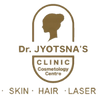Appointment
Connect With Us

.png)
Dr. Jyotsna Kanade
M.S.Gynaecologist, F.F.A.CDoctor Details
Dr. Jyotsna Kanade is a highly accomplished gynecologist, specializing in M.S. Gynaecology. Dr. Kanade has also completed Fellowships in Facial Aesthetic and Cosmetology (F.F.A.C.), allowing her to enhance her patients' natural beauty.


"Experience the Transformative Power of Micro Needling and Unleash Your Skin's Full Potential with Our Customized Treatment Plans at Jyotsna's Clinic"
Jyotsna Kanade - M.S.Gynaecologist, F.F.A.C (Fellowships in Facial Aesthetic And Cosmotology)




